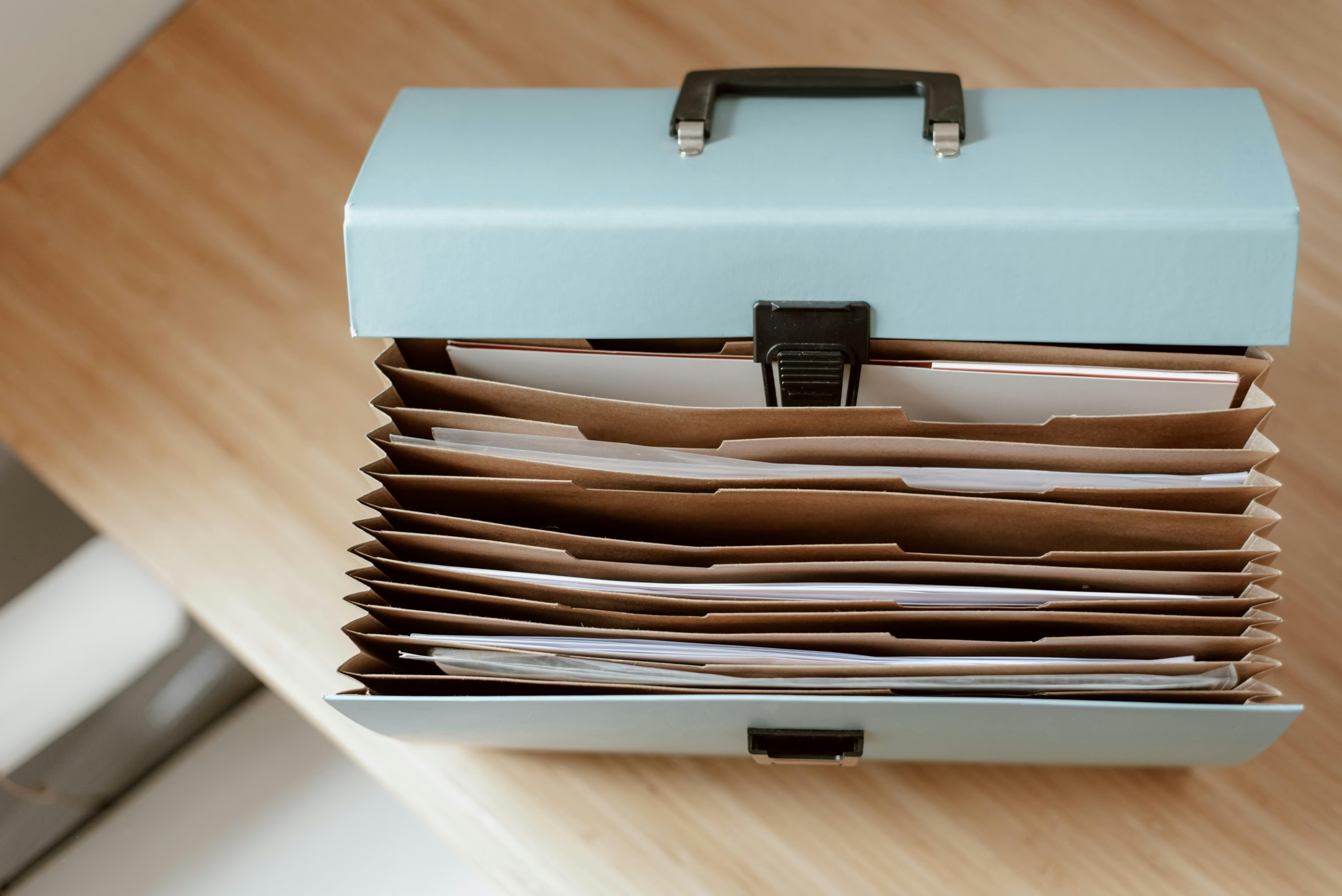Summer is the perfect time to tackle that stack of paperwork you’ve been avoiding since tax season ended. Whether you’re dealing with boxes of receipts, folders of financial statements, or digital files scattered across your computer, getting your tax documents organized now will save you significant stress when next year’s filing season arrives.
At JCT Tax Solutions, we’ve seen firsthand how proper document storage can make or break a smooth tax filing experience. The good news? With a simple system and some clear guidelines, you can transform your document chaos into an organized, accessible filing system.
The 3-7-Forever Rule for Tax Documents
Not all tax documents are created equal when it comes to how long you should keep them. Here’s our simple framework that covers most situations:
3 Years: Most Tax Returns and Supporting Documents The IRS generally has three years from when your return was filed or when it was due (whichever is later) to audit your return, so this is the minimum time to keep most tax-related paperwork. Important note: If you never filed a required return, the clock hasn’t started ticking yet—the IRS can go back indefinitely.
However, there are important exceptions to the three-year rule: The IRS has six years to audit returns where more than 25% of gross income was omitted, and there’s no time limit for fraudulent returns. When in doubt, keeping records longer is always the safer approach. This includes:
- Filed tax returns (federal and state)
- W-2s and 1099s
- Bank statements used for tax preparation
- Receipts for deductible expenses (medical expenses, charitable contributions, business expenses, state and local taxes)
- Records of potentially deductible expenses (it’s better to save receipts during the year and discard them later if they don’t end up being useful—you might not think you’ll have enough medical expenses to itemize in January, but by December your situation could be very different)
- Records of charitable contributions
- Documentation for credits claimed
7 Years: Business Records and Special Situations Some situations require longer retention periods:
- Business expense records and receipts
- Records related to worthless securities or bad debt deductions
- Documentation for casualty losses
- Records supporting basis in property or investments
Forever: Important Property and Investment Records These documents should be kept for as long as you own the asset, plus the applicable retention period after you sell:
- Real estate purchase and improvement records
- Home improvement documentation (receipts for improvements add to your home’s tax basis and can reduce taxes when you sell—save everything from major renovations to new roofing, HVAC systems, and permanent fixtures)
- Investment purchase documentation
- Records of inheritance or gifts received
- Retirement account contribution records
- Insurance policies and settlement documents
What You Can Safely Toss
After the appropriate retention period has passed, you can safely dispose of most tax documents. However, always shred or securely destroy documents containing personal information like Social Security numbers, account numbers, or other sensitive data. Many banks, credit unions, and community organizations offer free or low-cost shredding events throughout the year—these are great opportunities to safely dispose of large quantities of sensitive documents.
Safe to Discard After 3 Years:
- Old utility bills (unless claimed as business deductions)
- Credit card statements (unless supporting tax deductions)
- Bank statements not related to tax deductions
- Pay stubs (after receiving annual W-2)
- Receipts for non-deductible personal expenses
Red Flags: Never Throw Away Some documents should never be discarded:
- Social Security cards
- Birth and marriage certificates
- Wills and estate planning documents
- Military service records
- Original property deeds
- Final pension or retirement account statements
Digital vs. Paper: Choosing Your Storage Method
Both digital and paper storage have advantages, and many people find a hybrid approach works best.
Digital Storage Advantages
- Space-saving: Eliminates physical storage needs
- Searchable: Easy to find specific documents
- Backup-friendly: Can be stored in multiple locations
- Shareable: Easy to send to tax professionals or other advisors
- Environmentally friendly: Reduces paper waste
Paper Storage Advantages
- Universally accepted: All organizations accept original documents
- No technology dependence: Always accessible
- Legal preference: Some legal situations favor original documents
- Simplicity: No scanning or digital organization required
Creating a Hybrid System
Many of our clients find success with this approach:
- Scan important documents for easy access and backup
- Keep paper originals of critical documents (property deeds, wills, insurance policies)
- Store receipts digitally using smartphone apps during the year
- Maintain paper copies of the current year’s tax returns and supporting documents
Organizing Your Tax Document Storage System
For Paper Documents
Create Main Categories:
- Current Year: All documents for the current tax year
- Prior Years: Organized by year (2024, 2023, 2022, etc.)
- Permanent Records: Property, investments, and lifetime documents
- Business: If you’re self-employed or own a business
Within Each Year Folder:
- Income documents (W-2s, 1099s, business income)
- Deduction receipts (medical, charitable, business expenses)
- Investment records (brokerage statements, dividend records)
- Completed tax returns and related correspondence
For Digital Documents
Folder Structure:
Tax Documents/
├── 2025 Tax Year/
│ ├── Income/
│ ├── Deductions/
│ ├── Investments/
│ └── Filed Returns/
├── 2024 Tax Year/
├── Permanent Records/
└── Business Records/
Naming Conventions: Use consistent file names like:
- “2025_W2_CompanyName”
- “2025_Receipt_Medical_DrSmith_0315”
- “2025_Charitable_UnitedWay_1201”
This makes documents searchable and easy to locate during tax preparation.
Storage Location Best Practices
Physical Storage
- Fireproof safe or safety deposit box: For irreplaceable documents
- Home filing cabinet: For current and recent years’ documents
- Climate-controlled area: Avoid basements, attics, or areas prone to moisture
- Easy access: Store current year documents where you can easily add new items
Digital Storage
- Local backup: External hard drive or computer storage
- Cloud storage: Secure cloud services for backup and access across devices
- Multiple locations: Never rely on just one storage method
- Password protection: Use unique, strong passwords for all accounts containing tax documents. Consider using a password manager to generate and store complex passwords securely. Many cloud storage services also offer additional security features like two-factor authentication or secure folders that require extra verification before accessing sensitive documents.
Security Considerations
Whether storing physically or digitally, security should be a top priority:
- Limit access: Only trusted family members should know storage locations
- Regular backups: Test your backup systems periodically
- Inventory list: Keep a list of important documents and their locations
- Insurance documentation: Photograph or scan valuable items for insurance purposes
Making Document Storage a Year-Round Habit
The best document storage system is one you maintain consistently throughout the year. Here are strategies to stay organized:
Monthly Tasks:
- File new receipts and statements in appropriate folders
- Update digital files with consistent naming
- Backup digital documents to multiple locations
Quarterly Tasks:
- Review and organize accumulated documents
- Purge outdated or unnecessary paperwork
- Update inventory lists for important documents
Annual Tasks:
- Create new folders for the upcoming tax year
- Archive documents from three years ago (or longer, as appropriate)
- Review and update your storage system
Technology Tools That Can Help
Several types of apps and tools can streamline your document storage:
Receipt Scanning Apps: Many smartphone apps can turn your phone into a portable scanner, creating PDFs of receipts and documents for easy storage and organization.
Expense Tracking: Various apps and software options can automatically categorize expenses and store receipt images, with some integrating directly with accounting software you may already be using.
Cloud Storage: Most people already have access to cloud storage through services they’re paying for or that come free with other accounts. These can provide reliable document backup and easy access across multiple devices.
When Life Changes, Update Your System
Major life events often require adjustments to your document storage system:
Marriage or Divorce:
- Combine or separate filing systems
- Update access permissions and passwords
- Review beneficiaries on important accounts
Home Purchase:
- Create new property records folder
- Store mortgage and improvement documentation
- Keep property tax records accessible
Business Launch:
- Establish separate business document storage
- Set up systems for ongoing business record-keeping
- Consider professional bookkeeping software
Retirement:
- Organize pension and Social Security documentation
- Consolidate investment account records
- Plan for estate document accessibility
Red Flags: When to Seek Professional Help
Some situations are complex enough that you should consult with a tax professional:
- Missing critical documents: We can help you request replacements from the IRS or other sources
- Audit notifications: Enrolled Agents, CPAs, and attorneys can guide you through the process and represent you before the IRS. If you receive an audit notice, give us a call—we can help you understand what’s required and represent your interests throughout the process
- Complex business records: Proper business document retention requires specialized knowledge
- Estate or inheritance issues: These situations have unique documentation requirements
Getting Started: Your Summer Document Organization Project
Ready to tackle your document storage? Here’s a step-by-step approach:
Week 1: Assess and Plan
- Gather all your current tax documents
- Evaluate your current storage methods
- Decide on paper, digital, or hybrid approach
- Purchase necessary supplies (folders, labels, scanner, etc.)
Week 2: Sort and Categorize
- Create your folder structure
- Sort documents by year and category
- Identify documents that can be discarded
- Set aside items requiring special handling
Week 3: Implement Your System
- File or scan documents according to your new system
- Create backup copies of digital files
- Label everything clearly
- Set up security measures
Week 4: Establish Ongoing Habits
- Create a routine for handling new documents
- Set calendar reminders for regular maintenance
- Test your system by locating a few specific documents
- Make adjustments as needed
The Bottom Line
Proper tax document storage doesn’t have to be complicated, but it does require some initial effort and ongoing maintenance. The time you invest now in creating an organized system will pay dividends when tax season arrives, when you need to provide documentation for loans or other financial purposes, or if you ever face an IRS inquiry.
Remember, the best storage system is the one you’ll actually use consistently. Start with a simple approach that fits your lifestyle, and refine it over time as your needs change.
Need Help Getting Organized?
At JCT Tax Solutions, we understand that document organization can feel overwhelming. Whether you’re dealing with years of accumulated paperwork or need guidance on setting up systems for ongoing organization, we’re here to help. Our team can assist with document reconstruction, provide guidance on retention requirements, and help you establish systems that work for your specific situation.
Don’t let disorganized records complicate your next tax filing. Contact us today to schedule a consultation and take the first step toward stress-free tax document management.
The information provided in this blog is general in nature and has not been customized for your specific tax situation. Tax laws and regulations can be complex, and individual circumstances vary. For personalized advice regarding your document retention needs, please schedule a consultation with our professional team.



